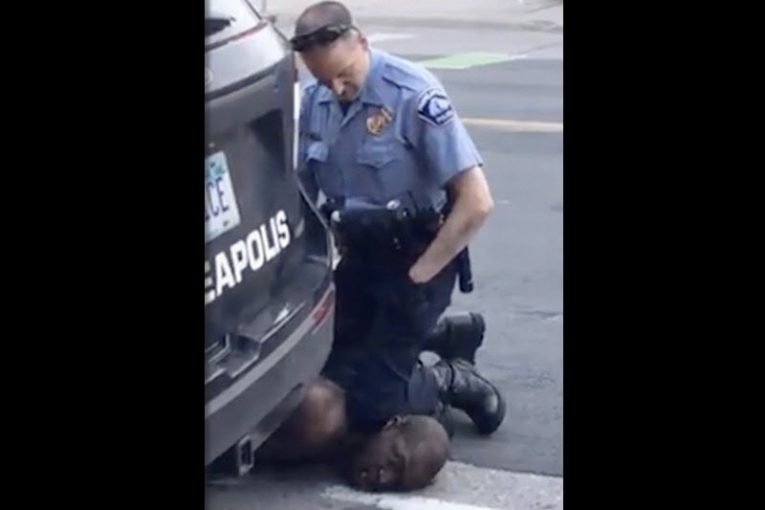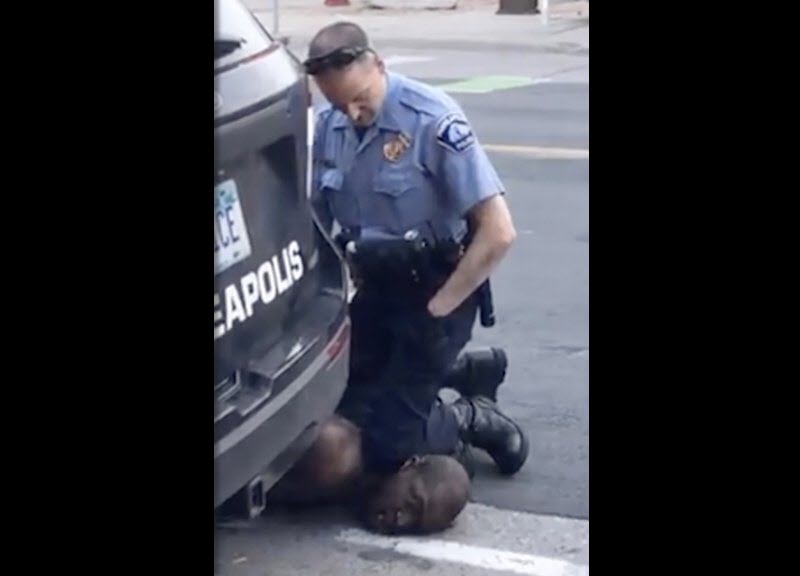

By Roxanna Jarvis and Macy Lu
MINNEAPOLIS, MN – On Day 9 of the former cop Derek Chauvin’s trial for the murder of George Floyd, the number of jurors increased to 12 from nine – 14 are needed – while Hennepin County District Judge Peter Cahill angrily ordered both parties to stop talking about the $27 million settlement.
“To be honest, I’m not going to talk about this second press conference,” stated Judge Cahill, referring to the conference earlier that morning in which Minneapolis City Attorney Jim Rowader discussed the timing of the settlement being made as jury selection continued.
“I’ve asked Minneapolis to stop talking about it – they keep talking about it. We keep talking about it. Everybody just – stop talking about it,” continued Cahill, raising his hand to further emphasize his point.
During the afternoon portion of jury selection, Eric Nelson, the defense attorney for Chauvin – charged with murdering George Floyd, sparking national protests – mentioned that the city had just announced it had no other alternative than to make a statement about the lawsuit at such a time.
Judge Cahill took note of this and Nelson’s comment that the agreement, “will not be finalized for another month, [raising] the question of whether the announcement was necessary regardless of timing.”
It was after jury selection that afternoon where things got heated. Prosecutor Steve Schleicher indicated that Nelson’s information about the conference was “third-hand information” and needs  to be submitted as a declaration or other form of proof.
to be submitted as a declaration or other form of proof.
As Schleicher began to claim that the Court has not limited Nelson’s ability to file such information, Cahill cut him off.
“Let’s just stop right there. As an officer of the court, Mr. Nelson was noting something that was in progress almost, and he has the right to do that,” Cahill said, then noting how they have been in session since 8:30 a.m., and filing an affidavit to be read that same night is highly unlikely.
“You should not be criticizing each other for noting for the record things that are happening in an emergent matter,” Cahill continued.
He then pointed out the clear difference in resources between both sides. “Let’s recognize the fact that the state has a lot of lawyers on this case who can sit outside this courtroom and start grinding out things. Mr. Nelson does not have the same level of support.”
Prior to the tense conversation, the day opened with the prosecution contending why the court should permit a forensic psychologist to testify on the general behavior of someone undergoing trauma and anxiety.
On behalf of the prosecution, Jerry Blackwell underscored that the Minneapolis police use of force policy outlines a difference in how officers should respond depending on whether a suspect is demonstrating “an attempt to resist” or “an inability to comply” based on factors such as “behavioral crisis.”
The expert witness’s testimony, Blackwell explained, can help determine which of the two reactions Floyd exhibited during his arrest.
The defense claimed that bringing in an expert witness to characterize Floyd’s behavior “opens the door” for him to employ evidence from Floyd’s May 6, 2019 arrest. Because of the striking similarities between the circumstances and Floyd’s reaction in both the 2019 arrest and the 2020 arrest, they hoped to draw on the parallels between the two incidents in their argument.
Judge Cahill reminded the prosecution that resisting arrest is not “mutually exclusive” from experiencing a mental health crisis though the latter may induce the former.
He plans to rule on this matter along with the issues of continuance and relocating the trial elsewhere in light of the protests Friday morning.
With the discourse on the forensic psychologist concluded, the court resumed jury selection, beginning with Juror 86, who was quickly excused after she explained that she regularly overhears the news since others in her household have it on “morning, afternoon, and into the night.” She also admitted that hearing about the Floyd family’s settlement has exacerbated her preference for the plaintiff.
The court then summoned Juror 87, a stay-at-home mother with five adult children, who has only loosely followed the news surrounding Chauvin’s case. The prosecution exercised a peremptory strike against her after probing her views on the media and discrimination in addition to the criminal justice system.
She “somewhat” agreed that “discrimination is not as bad as the media portrays it to be” and also asserted that they tend to “exaggerate a lot of things.” As for whether she views the criminal justice system discriminates against minorities, she responded, “I don’t believe the system has been written in to be discriminatory…I don’t know if I would agree that it is [discriminatory] as a blanket statement.”
At the beginning of Juror 88’s questioning, the court went off the record to ask her more intimate questions about their relationship with a certain witness. Judge Cahill then dismissed her because of the nature of her relationship the witness and the possibility that the juror’s presence may affect the witness’s testimony on “sensitive material.”
Juror 89, a cardiac care nurse who lives alone, was the only one out of the four questioned from the morning session that the court selected for the panel, despite the fact that she was aware of the settlement.
Given her medical background, both the defense and prosecution were especially interested in whether that might hinder her from forming an opinion only on court evidence and expert testimony. She explained she would be willing to hear “what the experts would say” and “how the judge directs us to follow on the law.”
When asked if she had already formed an opinion as to the actions of Chauvin during the arrest, the cause of Floyd’s death and who was responsible, she replied that she had not. Regarding whether she would draw on her professional experience to play the role of an “expert witness” when deliberating with other jurors, she stated, “I’m not a witness, so…yes.”
After the lunch break, the court continued with their selection process. The first person considered for the afternoon, Juror 90, is an IT systems administrator who was ultimately excused from the juror position after admitting he would be unable to hold aside his bias about police officers in the case that he had to judge the credibility of one’s testimony.
The man earlier expressed his belief that Chauvin caused Floyd’s death and the amount of force he used was “lethal.” In addition, he believes there exists the “militarization and systematic racism of policing in America.”
The second decided juror of the day (Juror 91) is a retired marketing professional with a degree in child psychology and a grandmother who volunteers to teach children in need.
Regarding the George Floyd’s murder, the juror, who is Black, indicated that she only knows the case from a surface level, only seeing the video for about four to five minutes before shutting it off. “It just wasn’t something that I needed to see. As I shut off quite a few things in the news. I seldom watch the news.”
In her questionnaire to the court, she mentioned that she was neutral in her opinions of both Chauvin and Floyd. “I don’t know what I don’t know,” she explained.
The woman was then asked about her relative, who happens to be an officer in the Minneapolis Police Department. She mentioned that she sees this relative four to five times a year, but is “not super close” with him/her and has “never spoken about their job or what it’s like doing [the] job.”
“I’m proud of my relative for standing up and being a police officer,” she added.
When describing her opinions about Black Lives Matter, the juror noted her favorable response to the cause. “I am Black, and my life matters.”
The last juror selected during the afternoon, Juror 92, works in the commercial insurance industry. When describing her initial impressions of both Chauvin and Floyd in the questionnaire, she wrote that “the media paints Derek Chauvin as an aggressive cop with tax problems” and that she heard Floyd’s “record wasn’t clean and that he abused drugs at some point.”
When asked about her general views of Floyd if she learned that he abused drugs, the juror replied, “If it was someone I was going to trust, in that kind of instance, it might give me pause, but I do understand that people, there’s reasons they struggle with addiction.”
“It doesn’t make him a bad person I guess I should say,” the juror quickly added.
She indicated that she would be able to set that information aside and hear from both sides. “I understand what I’m hearing is just coming from certain parties and that’s not fairly true,” she said.
Regarding her view on both Black Lives Matter and police officers, the juror has a “somewhat favorable” opinion of the BLM movement, but does not participate in supporting the cause. Her belief is that discrimination of Blacks and other minorities exists, but is not applicable to every single incident.
She indicated that she has a “very favorable” view of Blue Lives Matter and “strongly disagrees” with defunding the Minneapolis PD. In the questionnaire, she wrote, “I would be terrified if they dismantled our police departments. However, it is obvious that change needs to happen.”
The last considered candidate for the day was quickly excused after stating that he would be unable to focus on the evidence in court knowing that in the future his name would be released publicly, therefore potentially bringing harm to himself and his family.
Friday, Judge Cahill will most likely announce whether he will grant the motion by the defense to either delay the trial due to the timeline of the settlement or move the trial to a different city, a change of venue.
Currently, the jury consists of six people of color and six people who are white – three Black men, one Black woman, two multiracial women, three white women, and two white men.

To sign up for our new newsletter – Everyday Injustice – https://tinyurl.com/yyultcf9
Support our work – to become a sustaining at $5 – $10- $25 per month hit the link: